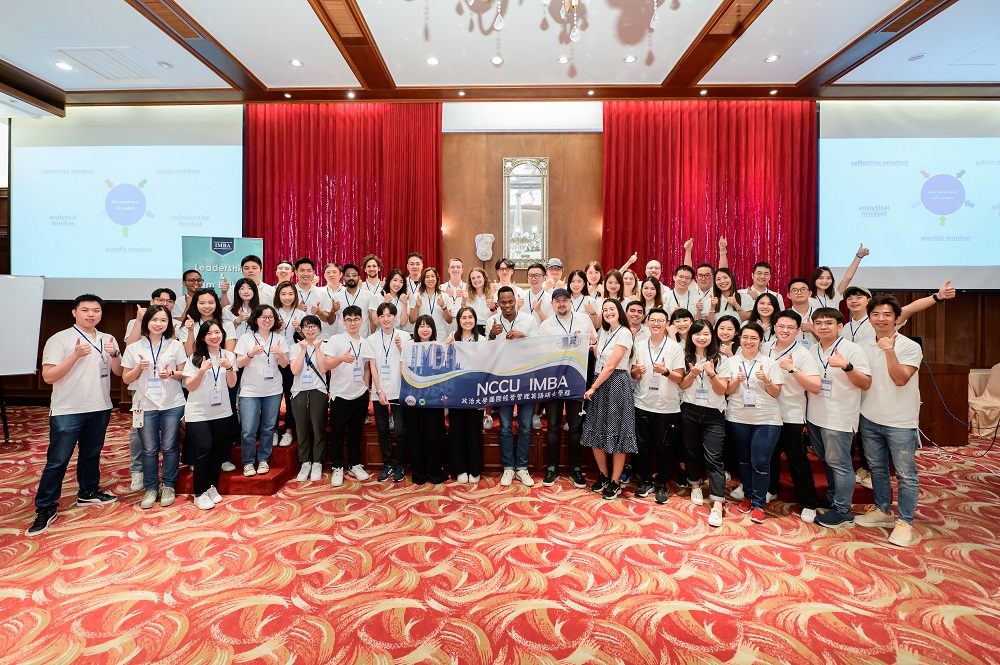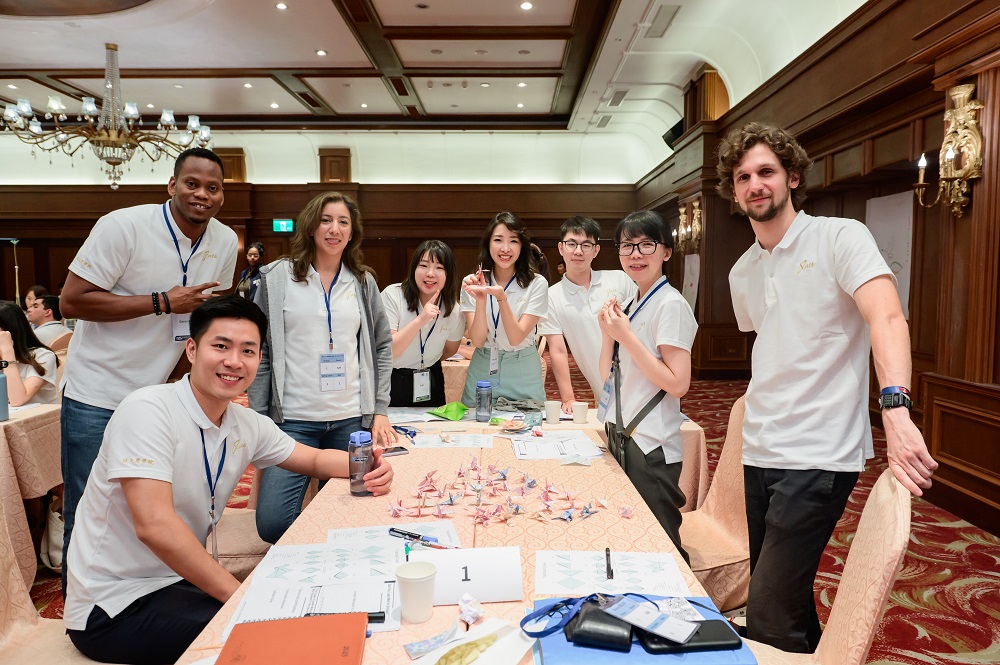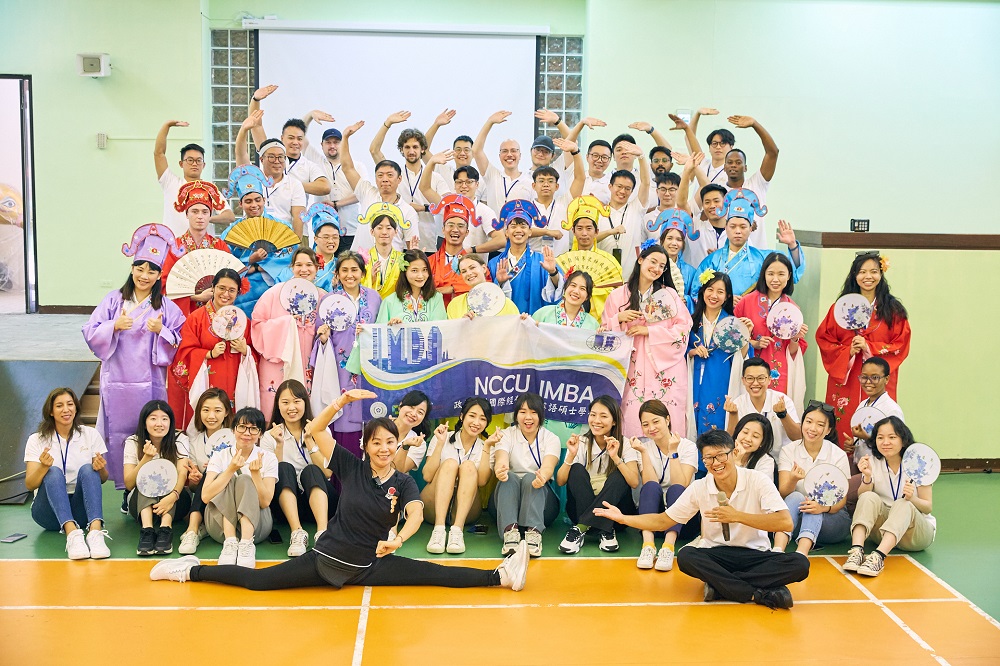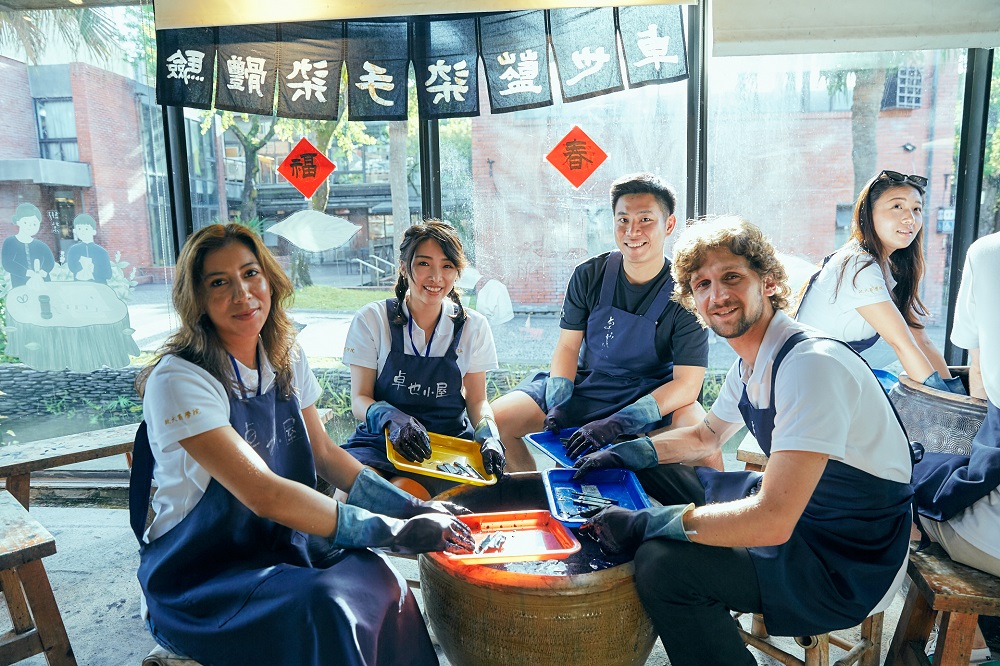IMBA Leadership and Team Building Camp: Nurturing Tomorrow's Leaders
【Article by College of Commerce】
In a world where effective leadership and teamwork are paramount, The IMBA Department of the National Chengchi University recently hosted an inspiring Leadership and Team Building Camp for 54 International Master of Business Administration (IMBA) students from diverse backgrounds. This transformative three-day experience, held from September 1st to 3rd, 2023, was designed to prepare students for their IMBA journey and instill fundamental leadership and team-building concepts essential for their future careers and personal growth.
Cultivating Leadership and Teamwork
The camp's core mission was to cultivate leadership skills and foster teamwork. IMBA Director, Professor Jason Tsai, warmly welcomed the participants, officially launching the event. The theme for the weekend, "Learning, Leading, and Linking," aptly captured the essence of what lay ahead. Under the guidance of Professor Weichieh Su, the students engaged in an activity aimed at better understanding both themselves and their peers. Through a series of questions and interactive discussions, they uncovered shared traits and characteristics within their assigned groups. This activity not only encouraged self-reflection but also laid the groundwork for building stronger bonds and appreciating diverse perspectives. This session also served as an opportunity for students to introduce something unique about their country.
One student aptly described the experience, saying, "Attending the camp at NCCU was a transformative experience that exposed me to various leadership skills, fostered teamwork, and promoted personal growth." The camp's curriculum emphasized leadership development through various activities, strategies, and problem-solving techniques, enriching the students' leadership qualities.
Teamwork in Action
The camp featured a series of activities that highlighted the importance of teamwork and leadership. Professor Dennis Hsu challenged students with a task to build the tallest spaghetti structure within a given timeframe, prompting them to display teamwork, patience, and perseverance. This demanding exercise emphasized the significance of groups and teams as fundamental work units. After the spaghetti challenge, the class transitioned to another group activity that focused on leadership development through Origami. Professor Hsu provided specific leadership roles to group leaders unbeknownst to students, this included democratic, autocratic, and laissez-faire styles, each with its own set of expectations. This exercise not only tested the students' teamwork and creative problem-solving skills but also encouraged them to critically reflect on the leadership styles they experienced during the Origami-building process. After the activity, students were encouraged to share their thoughts on their leaders and how these leadership approaches influenced their experience, adding depth to their understanding of leadership dynamics within teams. These exercises not only underlined the significance of teamwork but also provided valuable insights into the multifaceted nature of leadership.
Later in the evening, Professor Sungjun Stephen Park played a pivotal role by introducing students to a thought-provoking case study titled "How can one person change the conscience of an organization." This engaging session was a catalyst for collaborative discussions as students delved into the case study, sharing their insights and relating it to their own experiences. Professor Park's session not only stimulated critical thinking but also provided students with a practical understanding of how individuals can impact organizational values and ethics. Additionally, an exciting activity called the XY Game was introduced, where students worked within their respective groups to make decisions. In seven rounds, each group had to choose between X, representing good performance for their own team, and Y, indicating performance for the entire company. This dynamic exercise encouraged camaraderie and critical thinking as teams strived to achieve optimal individual and overall gains, offering a hands-on lesson in the dynamics of group decision-making.
One student, Emma Tourre from France, noted, "I often find Leadership courses to be too theoretical, but here it was not the case. That's why I truly believe I learned valuable lessons during this course, more than any Leadership course I had before."
Cultural Immersion and Creativity
Day two was a blend of creative thinking and cultural immersion. Professor Arthur Wang inspired students to think outside the box through various exercises and discussions. Through a series of exercises, students were encouraged to think beyond traditional boundaries and unleash their creativity. Activities such as military supply support, tower building, and exploration of creative inventions inspired students to approach problem-solving with fresh perspectives. The Cultural Experience field trip at the National Center for Traditional Arts exposed students to traditional Taiwanese opera, providing a deep appreciation for Taiwanese culture. Students participated in activities like leather card holder making, tie dye books marks and personalized wooden drink coaster crafting, igniting their creativity.
Additionally, there was a group activity component where students collaborated to solve puzzles to locate specific areas, and capture creative group photos. Student Divyanshu from India shared, "The introduction to the Taiwanese Opera was something new for me, experiencing and practicing at the same time. I am immensely grateful for the opportunity to be at the Leadership and Team Building camp organized by NCCU."
Building Empathy and Decision-Making Skills
The final day featured a thought-provoking exercise. Students were tasked with ranking patients deserving of a kidney transplant, fostering empathy and rational decision-making. This exercise emphasized the importance of understanding emotional and rational perspectives in leadership and decision-making.
In their own leadership display exercises, students showcased their ability to lead, interact, and use their leadership skills to guide their teams. The camp concluded on a high note with students leaving with newfound knowledge, friendships, and a renewed spirit for their IMBA journey. Student Anthony Santoso from Indonesia eloquently summarized the experience, saying, "The camp reminded me that simplicity and warmth are incredibly effective in getting to know new people, and basic introductions can forge a sense of belonging."
National Chengchi University's Leadership and Team Building Camp proved to be an invaluable experience for these IMBA students, equipping them with essential skills for their academic journey and future careers. As they embark on their IMBA program, these students are now well-prepared to be the leaders of tomorrow, armed with a profound understanding of leadership and teamwork. The camp's emphasis on real-world applications of leadership and team dynamics was a refreshing departure from traditional classroom-based learning. Students had the opportunity to put theory into practice, experiencing firsthand the nuances of leadership styles, the intricacies of group dynamics, and the importance of cultural sensitivity in global teamwork.
Emma Tourre highlighted the practical nature of the camp. She appreciated the departure from theoretical learning, emphasizing that the camp provided valuable lessons that surpassed her prior experiences in leadership courses. Emma's leadership role during the origami activity allowed her to witness the effects of different leadership styles, a valuable lesson in itself.
As Anthony Santoso reflected on his journey from the initial sense of homesickness to the camaraderie and personal growth he experienced during the camp, it became evident that this event had a profound impact. Beyond the academic curriculum, the camp taught life lessons—simplicity, warmth, and the value of making mistakes. It forged a sense of belonging among students from diverse backgrounds.
In conclusion, the Leadership and Team Building Camp at National Chengchi University serves as a shining example of how experiential learning, cultural immersion, and practical leadership exercises can shape the leaders of tomorrow. It equips students not only with knowledge but also with the skills, values, and perspectives needed to excel in a diverse and interconnected world. NCCU's commitment to providing transformative experiences sets a benchmark for leadership education, empowering its students to navigate the challenges of the future with confidence and competence.

Students who attended the Leadership and Team Building Camp at NCCU, bonded by shared experiences and a commitment to personal and professional growth. (Photo by College of Commerce)

Students proudly displaying their meticulously crafted origami creations. (Photo by College of Commerce)

A Snapshot of Joy: IMBA Students radiating smiles after an engaging session exploring the world of Taiwanese Opera. (Photo by College of Commerce)

Unleashing Creativity: IMBA Students Dive into Tie-Dye Bookmark Crafting! (Photo by College of Commerce)
